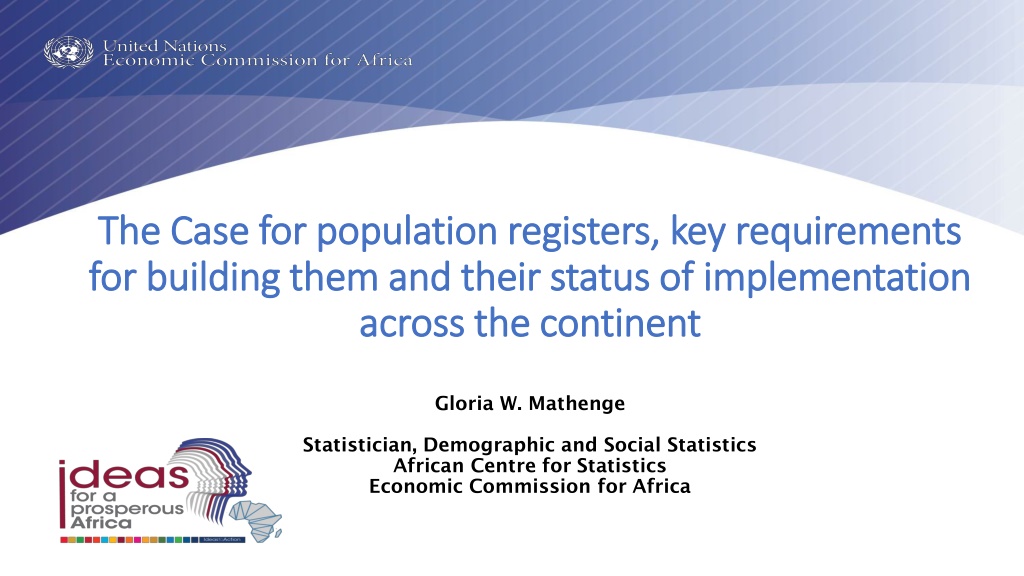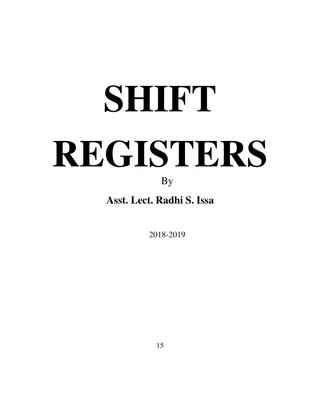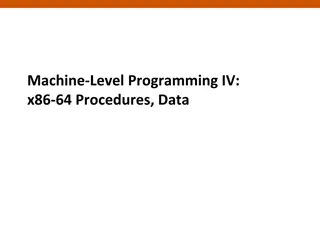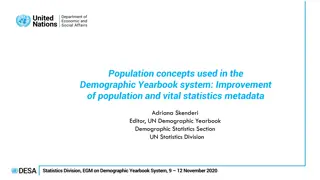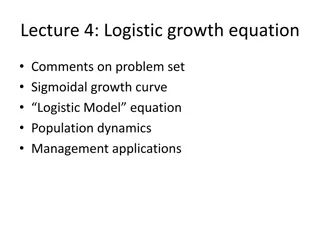The Case for Population Registers: Key Requirements and Implementation Status Across Africa
Population registers play a crucial role in providing robust and timely population data, especially in the current era emphasizing rigorous measurement and monitoring of human development. Implementing e-government platforms and facing challenges like the Covid-19 pandemic have highlighted the importance of population registers in ensuring accurate and up-to-date demographic information.
Download Presentation

Please find below an Image/Link to download the presentation.
The content on the website is provided AS IS for your information and personal use only. It may not be sold, licensed, or shared on other websites without obtaining consent from the author. Download presentation by click this link. If you encounter any issues during the download, it is possible that the publisher has removed the file from their server.
E N D
Presentation Transcript
The Case for population registers, key requirements The Case for population registers, key requirements for building them and their status of implementation for building them and their status of implementation across the continent across the continent Gloria W. Mathenge Statistician, Demographic and Social Statistics African Centre for Statistics Economic Commission for Africa
Outline Outline 1. Population registers in the current development context 2. Definition and conceptual framework for population registers 3. Key requirements for establishing functional population registers 4. The state of implementation of population registers across the continent 5. Conclusion and recommendations
Population registers and their relevance in Population registers and their relevance in the current development context the current development context 1. The current data era calls for more robust, timely, frequent and disaggregated population data that can enable rigorous measurement and monitoring of human development. Population registers provide one of the best source of population data 2. Many African governments are implementing e-government platforms aimed to streamline public administration and service delivery. These require unique identification of individuals within a population through a single verifiable identity record and/or credential. Population registers facilitate identification of all residents within a population 3. The Covid-19 pandemic had a critical impact on traditional population data collection methods including censuses in many countries underlining the importance of Administrative data sources. 53% (158) of countries had to post pone their Census due to the Pandemic (UNSD global survey)
What are population registers? What are population registers? The United Nations defines population registers as: records all residents in the country, together with their basic demographic information, and updates for births, deaths, changes of marital status, international migration (both into and out of the country), and internal migration (by recording changes of address within the country). United Nations handbook on Registers-Based Population and Housing Censuses (2022). Population registers are accounts of residents within a country maintained via the legal requirement that both nationals and foreigners residing in the country must register with the local authorities
Two types and functions of population Two types and functions of population registers? registers? The term population register is often used in reference to an administrative information system used primarily by public agencies for administrative purposes. However, population registers exist in two distinct forms: a. As administrative population data systems (administrative population registers) that can also be used for statistical purposes; b. Statistical population data systems (statistical population registers) commonly built on the basis of existing administrative population records. Even where statistical registers are constructed on the basis of a census database, an administrative register is needed to enable updating
Population registers and their relevance in the Population registers and their relevance in the current development context current development context Population foundational implementation of register-based censuses registers register are for a successful major Global surveys conducted by UNSD in 2009 and 2019 show gradual increase in the number of countries moving from traditional to fully register or combined methods approaches between the 2010 and 2020 census rounds. Though mainly in the Asia and Europe, these changes paint a picture of evolution of census methods around the world and highlight the rewards (including those in Africa) can reap from implementing population registers that countries
Population registers a key pre Population registers a key pre- -conditions for a register based census register based census conditions for a 1. Existence of a national law providing for the creation of a population register and authority to access and use the data contained in it for statistical purposes; An established central population register; High-quality data in the population register with comprehensive geographical coverage; An effective system of continuous updating of the population register; Harmonized concepts and definitions adopted in the various registers used; A universal personal identification (unique identity) system to facilitate the effective linking of data; Quality and consistency checks to verify the suitability of the data contained in various registers, including the presence of a timestamp to ensure that the location and characteristics of enumerated units relate to the same reference point in time. 2. 3. 4. 5. 6. 7.
Pros and Cons of a register Pros and Cons of a register- - based census based census
Reduced operating costs if registers/admin databases already exist & funded. Some Reduced/no response burden for citizens Advantages of a register- based census Processing of results faster than for a traditional census May include citizens who are hard to reach in traditional censuses e.g., Highly mobile or have multiple residences and those that don t engage with censuses, but are in administrative systems More frequent outputs annual outputs on pop count, employment
Some Disadvantages of a register-based census Initial costs may be high (setting up systems, assessing and improving quality of registers/admin data sources) Dependency on the operators of the registers to maintain them to quality needed for statistical purposes. Influence of the NS0 over the admin source may be limited Admin systems may change over time which may undermine comparability of data internationally and over time Register characteristics collected primarily for administrative purposes rather than a statistical purpose e.g., Population base may not match that needed for the census
Creating and Creating and maintaining an maintaining an administrative administrative population population registers registers
Functional requirements for the establishment of a population register
Establishment of population register Establishment of population register 53rd session of the United Nations Statistical Commission: Implementation of the 2020 World Population and Housing Census Programme Recommendation: (c) To encourage national statistical authorities to consider the establishment of national statistical population registers on the basis of the census master file produced in the 2020 round of censuses in full compliance with the provisions of the Fundamental Principles of Official Statistics; https://unstats.un.org/unsd/statcom/53rd-session/documents/2022-8-Censuses-E.pdf
Status of population registers in Africa Status of population registers in Africa In Africa, the status of implementation of administrative population registers ( in alignment to the UN definition- especially linking births and deaths collected through civil registration and international migration data) remains unclear. An assessment is currently ongoing to collect this information among countries. African countries that might be in a position to have and maintain an administrative population register include: South Africa, Cote d Ivoire Eritrea, Namibia, Kenya. In some of these countries, though named so, the registers do not capture migration data African countries known to use their administrative population register for statistical production include Eritrea. In Eritrea, the register is used to derive: Population size by region, sub-region, urban, and rural areas, according to sex, age, marital status, ethnic groups, religion, level of education, and other background characteristics
Opportunities and challenges for the registers Opportunities and challenges for the registers in Africa in Africa Opportunities: Significant investments in CRVS systems have been made by many countries. A few countries are now reporting levels of registration completeness of above 90% for birth and death A significant number of countries are now implementing national ID systems. Advocacy for the UN Legal identity agenda has encouraged implementation of population registers among many countries Challenges Lack of universal vital event registration in many countries Challenges in collection of migration data
CRVS completeness levels in selected countries CRVS completeness levels in selected countries UNECA, 2022 Report on implementation of resolutions of the 5th Conference of African Ministers responsible for Civil registration Botswana 100% (birth) and 80%(death) Congo 95% (birth) and 80%(death), 2021 Mauritius 100% (birth) and 100%(death), 2021 South Africa 89% (birth) and 96%(adult death), 2020 Seychelles 90% (birth) and 90% (death), 2018 Sao Tome & Principe 95% (birth) and 100% (death), 2021 Tunisia 100% (birth) and 100% (death), 2021
Conclusion, recommendations areas of Conclusion, recommendations areas of discussion discussion We have two sets of countries: Countries without population registers but with highly complete Civil registration (90% birth and death registration) encourage their implementation Countries with population registers encourage their use and begin testing how feasible they are for use in supplementing the census Are register-based censuses a possibility for the continent in the 2030 census round? Are there countries that may be in a position to experiment on use of the registers in this round? If not, what can be done to prepare for possible implementation in the 2030 or 2040 rounds?
References References 1. United Nations, 2014. Principles and Recommendations for a Vital Statistics System. Department of Economic and Social Affairs. https://unstats.un.org/unsd/demographic/standmeth/principles/m19rev3en.pdf World Bank. 2019. ID4D Practitioner s guide: Version 1.0 (October2019). Washington, DC: World Bank. Page 221. The Organisation for Economic Co-operation and Development. OECD Glossary of Statistical Terms - Population registers Definition. https://stats.oecd.org/glossary/detail.asp?ID=2089 United Nations, 2020. Implementation of the United Nations Legal Identity Agenda: United Nations Country Team Operational Guidelines. https://unstats.un.org/legal- identityagenda/documents/UNCT_Guidelines.pdf Gloria Mathenge, Petra Nahmias, Tanja Sejersen, Statistician, and Afsaneh Yazdani, Statistician, 2020. Population Registers: A Key Resource for Producing Vital Statistics. ESCAP Stats brief. Stats Brief, issue no. 26 (October 2020) (unescap.org). https://www.unescap.org/sites/default/d8files/knowledgeproducts/Stats_Brief_Issue26_Oct202 0_A_Key_Resource_for_Producing_Statistics.pdf United Nations, 2018. United Nations Legal Identity Agenda Fulfil the promise to Leave No One Behind. https://unstats.un.org/legal- identityagenda/documents/Conference%20in%20Prep%20for%20HLPF2019%201%20pager_final .pdf 2. 3. 4. 5. 6.
